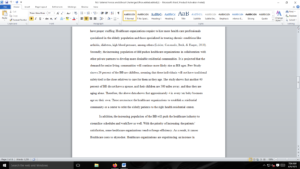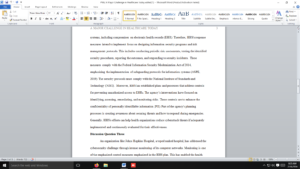Write a 3-5 page executive report that explains how a market force affects the health care industry and describes an associated ethical challenge that could influence management practices. Recommend two strategies to prevent or address the ethical challenge and explain how the strategies maintain compliance with external regulations.
Introduction
External market forces present a tremendous challenge to a health care manager. Any changes in society connected to demographics, the government, economics, politics, legislation, and even weather can affect the health care industry. This is true on global, national, state, and local levels. An effective manager must stay abreast of current issues, while simultaneously attempting to accurately forecast and prepare for future change.
In addition, there is an overwhelming array of both mandatory and non-mandatory regulatory agencies and organizations that control the health care system. The organizations can be national, state, or local, and include consumer advocacy organizations as well. They exist as external entities to protect the community and limit the power of the industry in various ways. Health care managers have a responsibility to understand, remain updated on, and assure compliance with specific guidelines and regulations in their sector of the industry to remain in compliance and uphold an outstanding reputation for themselves and their organization. Strategic planning, development, and implementation of policies and procedures, training of staff, and building a strong organizational culture support this compliance. They also present internal opportunities for effective leaders to model stewardship and fiduciary duty toward the community.
Successful health care managers model stewardship and fiduciary duty by reaching outward to serve as advocates for their organization and profession. Active participation in professional organizations is recommended as a strategy to build personal and organizational trust and integrity in the community. The concept of corporate social responsibility (CSR), based on the business management triple bottom line concept, is embraced by many health care organizations. The ethical perspectives of CSR support health care managerial efforts in the development of positive connections and partnerships in the community. This creates social value and is a demonstration of stewardship and fiduciary duty. This could translate locally, nationally, or globally, depending on the type of health care organization involved.
In addition to our evolving health care reform efforts, three major influential market forces are affecting our current health care system. On a fundamental level, the transition from a patriarchal to a managed-care system has dramatically changed the delivery of health care services. The demographic shift in our population due to the aging of the baby boomers is causing a profound change in the health care industry. Public interest in and demand for integrative medicine alternatives and options, especially in terms of surgical and injury recovery, pain management, and cancer treatment, is expanding. Ethical issues and considerations, based on these external market forces, are emerging and forcing organizations and managers to come up with new and effective strategies, policies, and procedures to successfully prevent and address them.
Preparation
For this assessment, suppose you work for a health care organization whose senior leadership strives to make ethical decisions related to ever-changing external forces. As part of the management team, you have been assigned to analyze one of the market forces affecting the health care industry. You need to choose one of the following market forces:
- Managed care.
- Caring for aging baby boomers.
- Integrative medicine.
Then you need to choose one segment of the health care system (insurance, reimbursement industry, hospitals, long-term care facilities, and so on) to use as the focus of this analysis. For example, you may decide to focus on integrative medicine in long-term care facilities.
Review the resources provided and conduct your own research on the topic you have selected. You will need to use current, relevant information and statistics from at least three authoritative resources to support your work. Be sure you also look at regulatory agencies that oversee the topic and health care system segment you selected.
Format this assessment as an executive report, following APA guidelines for citations and references. Please be sure you include a title page and a references page.
Instructions
In the executive report you develop for this assessment, be sure you complete the following:
- Explain how the market force you selected is affecting the health care industry. Include any statistics you found during your research.
- Describe at least one ethical challenge related to the market force that might influence organizational management practices.
- Recommend at least two strategies leadership might use to prevent or address the challenge. Consider whether a CSR initiative could help prevent the ethical challenge.
- Explain how your recommended strategies will maintain compliance with external regulations.
Additional Requirements
- Include a title page and references page.
- Number of pages: 3–5, double-spaced.
- At least three current, authoritative resources.
- APA format for citations and references.
- Times New Roman font, 12-point.
Note: The assessments in this course build upon each other, so you are strongly encouraged to complete them in sequence.
Competencies Measured
By successfully completing this assessment, you will demonstrate your proficiency in the course competencies through the following assessment scoring guide criteria:
- Competency 1: Explain how ethical theories and principles influence health care organizational management practice.
- Recommend strategies to prevent or address an ethical challenge.;
- Competency 2: Describe how external forces and internal organizational factors influence ethical health care management practices.
- Explain how a market force affects the health care industry.
- Describe an ethical challenge related to a market force that influences organizational management practices.
- Explain how strategies to prevent or address an ethical challenge maintain compliance with external regulations.
- Competency 4: Communicate ideas effectively.
- Correctly format citations and references using current APA style.
- Write content clearly and logically, with correct use of grammar, punctuation, and mechanics.
Answer preview
One of the strategies that the healthcare manager needs to implement is to address ageism and cultural barriers. One of the strategies that healthcare can implement is to train healthcare professionals to provide cultural competence care. The nursing professions will be required to have cultural knowledge when offering services to the aging baby boomers. Cultural knowledge involves obtaining information from clinical information from the elderly place. Having cultural awareness will help nurse practitioners to offer culturally competent services to this population (Markey & Okantey, 2019). Culturally competent care training will help the healthcare professional required to learn and understand the cultural beliefs, values,
[1259 Words]

Organizational management practices



